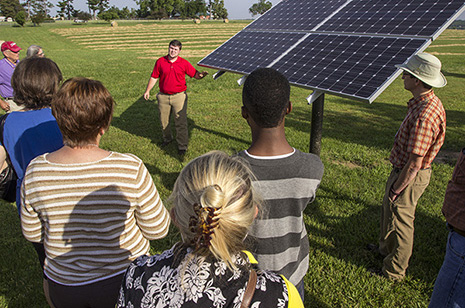
FAYETTEVILLE, Ark. – The Applied Sustainability Center at the Sam M. Walton College of Business at the University of Arkansas is hosting the Sustainable Communities Leadership Summit to highlight ways cities can leverage sustainability as an economic development strategy. One session will highlight 10 Arkansas cities that have demonstrated leadership in a particular area of sustainability or that have implemented an innovative solution.
“The idea is to celebrate what Arkansas cities are already doing to be more sustainable and to share best practices so that they are replicated across the state,” said Michele Halsell, managing director of the center.
The event’s Sustainable City Showcase highlights the sustainability work already being done by Arkadelphia, DeWitt, Eureka Springs, Fayetteville, Harrison, Jonesboro, Little Rock, Monticello, Russellville and Searcy. The summit will be Oct. 15-17 in North Little Rock at the Wyndham Riverfront Hotel.
“Sustainability offers economic benefits at multiple levels. This year’s summit participants will learn how smart growth strategies can help city government save costs and reduce the burden on taxpayers, while simultaneously helping residents save money on commuting-related expenses and help the city attract new investment,” Halsell said.
The event is aimed at local leaders including mayors, city council members, city professional staff, county elected officials and professional staff, chamber of commerce leaders, education professionals and non-profit leaders who are looking for innovative ways to boost their local economies. Sessions will focus on water conservation, energy efficiency, renewable energy, active transportation and local food systems as elements for enhancing economic prosperity, improving health and reducing environmental impact.
Speakers include Ruth Randleman, mayor of Carlisle, Iowa; John Robert Smith, co-chair of Transportation for America; Brent Bailey, regional coordinator for the 25x’25 Alliance; and numerous city leaders. Summit attendees will learn about a new LED lighting retrofit program that requires zero upfront investment and provides immediate savings to a city’s utility bills. The closing session will feature former and current mayors discussing the challenges and the rewards of building sustainable cities.
Optional field trips are being offered on such topics as building a local foods economy, historic preservation as an economic development tool and a green economic development field trip. This last field trip showcases many of North Little Rock’s sustainability assets. Post-summit workshops offer in-depth learning opportunities focused on walkability audits and implementing energy improvement districts.
The registration fee is $125 for the summit. Non-profit registration fee is $75 and students may register for $20. Field trips and workshops are $30-$40 each. To register, call 479-575-3393 or visit www.regonline.com/ASCSummit.
Topics
Contacts
Michele Halsell, managing director
Applied Sustainability Center
479-575-3044,
David Speer, senior director of communications
Sam M. Walton College of Business
479-575-2539,